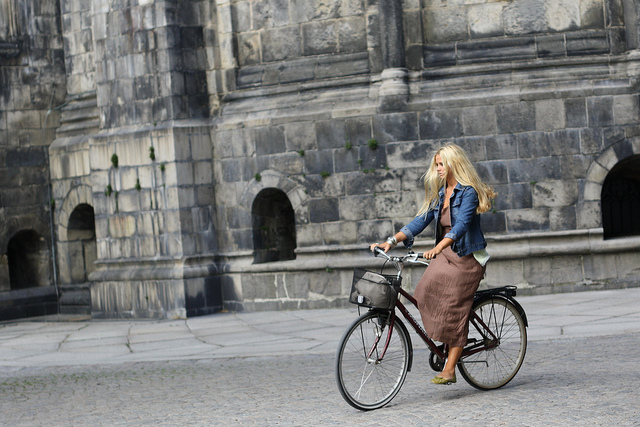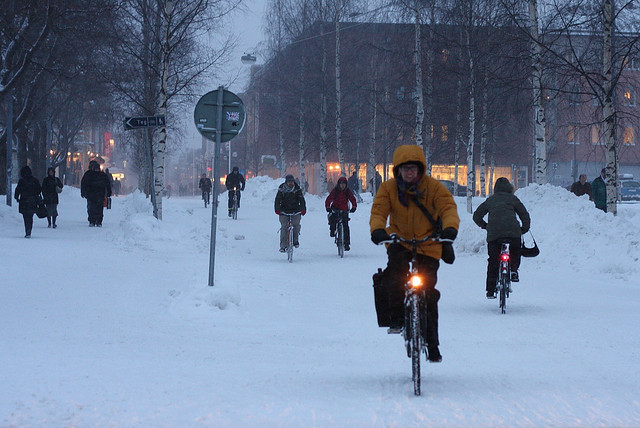
Busting Myths and Boosting Cycling - The Swedish Member of the Month
|
|
ECF visiting Sweden
A couple of weeks ago ECF went to Sweden to speak with Members of Swedish Parliament, local Stockholm politicians and transport authorities who were interested in learning about cycling initiatives and development in a European perspective.
DID YOU KNOW?
- The amount of cyclists in Stockholm has doubled within the 15 years (2010)
- A politician from Stockholm City Council, Per Ankersjö, is pushing for earmarking 1 billion Swedish kroners for making Stockholm as bikeable as Copenhagen and Amsterdam. The proposed budget goes by the name “The BikeBillion” (cykelmiljarden)
- Malmö did an interesting bike advocacy campaign called “No ridiculous car trips”
- Malmö and Lund is working on building a Bicycle Superhighway between the two cities.
- Currently the Eastern part of Denmark and the Southern part of Sweden, also known as the Oresund region is collaborating on making the region a "bicycle paradise". This so called bike region wants to improve the bicycle facilities for commuting as well as leisure cycling.
“It would appear that a seismic shift has taken place in Sweden. Bicycles, often heralded as idealistic fodder of the centre-left, are now appealing to all political parties, classical liberals included,” concluded one of ECF’s policy officers, Martti Tulenheimo, after the Swedish visit.
This month the ECF’s Swedish member, Cykelfrämjandet (Swedish Cycle Advocacy Association), is the Member of the Month. We had an interesting talk with Eva Lind-Båth from Cykelfrämjandet about the shift in political attitudes, the differences between Northern and Southern Sweden, and future challenges for Cykelfrämjandet.
A political shift
We were curious if our assumptions were correct. Has cycling becoming a talking point in Swedish politics?
“Yes it’s true, it seems like cycling has finally become a hot topic for the Swedish politicians. In a time where sustainability and environment are political buzzwords, supporting cycling as a mode of transportation has become a desirable political stand.”
The inevitable question is whether or not the political support for cycling is genuine or just cheap political branding.
“Well, we hope for the best” Eva responds “if you want changes, though, you should be willing to pay for it as well. It’s hard to tell how sincere the political promises are before the actual budget for bicycle initiatives have been decided. But we are doing as much as we can to inspire the politicians and planners by taking them on study tours to countries like Denmark and The Netherlands”.
Political action has already been taken. For the very first time in Swedish history, cycling as a mode of transportation was included in an infrastructure proposal (Framtidens resor och transporter- infrastruktur för hållbar tillväxt proposition 2008/2009:35) prepared by the Swedish Government and accepted by the Parliament in December 2008.
“We were so thrilled when we got the news. For many years it’s been an uphill battle for Cykelfrämjandet, both internally and externally. The acceptance from the Parliament is one of many things that shows we’re back on the right track. Cycling is finally getting in the spotlight and being accepted as a proper mode of transportation.”
Cykelfrämjandets Kommunvelometer
There’s still a long way to go, though, and one of the most important areas of action is the local support and advocacy for cycling. But how do you do that most effectively?
“Inspired by the BYPAD project we wanted to rate the Swedish cities based on their bicycle development and initiatives. We call it Cykelfrämjandets Kommunvelometer ( Cykelfrämjandets City Velometer). This has an amazing effect on the cities' commitment towards cycling, politically as well as in terms of planning. The city planners are very interested in the City Velometer because we’re giving them a voice, and also because the competition and rating system make politicians more willing to spend extra on mobility initiatives.”
Cykelfrämjandets Kommunvelometer is in its third year and more than 30 cities will be competing in 2012.
|
Umeå (640 km north of Stockholm). Credit: MaximeF |
North vs. South – myth busting the influence of weather and mindset
Is the City Velometer worth the time and effort? Isn’t it just an unchangeable reality that Southern Sweden is doing a whole lot better than Northern Sweden when it comes to cycling as a mode of transportation?
Winter Cycling in Östersund
“It’s true that a lot more people bike in Malmö than in Stockholm, but it's a myth that it has anything to do with Northern vs. Southern Sweden!" says Eva Lind-Båth from Cykelfrämjandet. One of the places that proves the myth wrong is Östersund.
“It’s true that a lot more people bike in Malmö than in Stockholm, but it's a myth that it has anything to do with Northern vs. Southern Sweden! Take Umeå (640 km north of Stockholm) for example, which has an impressive bike culture. It’s a college town which partly explains the many cyclists, but really I think the main reason for the bike success in Umeå is due to the city’s impressive effort in clearing the paths for snow and ensuring good infrastructure. This goes against the typical argument of weather being a main opposing factor. Also in Västerås and Östersund you’ll find many people biking. If people are biking in Sweden, it has to do with the effort the municipality has put in it – not the weather or a certain regional mindset!”
So it would appear that local planners have managed to get the politicians' support for bicycle initiatives.
“That’s why I think the City Velometer plays an important role in the future development of Swedish bicycle culture.” adds Eva
Today’s and future challenges for Cykelfrämjandet?
“At the moment one of Cykelfrämjandets biggest challenge is to get young people to join the organization. The average age of our members is now 60. That’s a problem if the organization still wants to exist in the future. We are experiencing that young, mainly intellectual people, who are interested in urban planning, are beginning to join Cykelfrämjandet, but all in all we need to be a lot more attractive for younger people, teenagers and families with young children. This leads me to a second priority of Cykelfrämjandet, namely targeting children. If they don’t start biking while they're still young, we won’t have any cyclists in 20 years. At the moment we’re learning from Denmark and the “Cycling Games” that the Danish Cyclists’ Federation has developed. We’re translating the book, making games for this summer’s bike festival in Stockholm, and hopefully we’ll have a more comprehensive strategy in the future on how to make cycling a part of the Swedes’ everyday life from an early age.”
“Another thing on our agenda right now is the infrastructure in between cities. A rise of long distance commuting, as well as leisure biking, calls for a drastic improvement of the city's connecting roads. In Stockholm for example we have discovered that more and more middle-aged men with medium to high incomes are starting to commute long distances by bike (insert PDF: Värdering av tid och bekvämliget) to avoid getting stuck in traffic. This is a new segment that I’m sure will keep growing if we ensure adequate infrastructure.”
When looking at Sweden, one cannot talk about one national bicycle culture, but rather many independent bike cultures in the various cities, spread out over the long and beautiful Scandinavian country. This makes Cykelfrämjandet an all the more important key player in steering the recent political interest and developing Sweden into an even better cycling country than it is now.
About the Interviewee:
Eva Lind-Båth is an everyday cyclist in Stockholm and has been a member of Cykelfrämjandet for many years. In relation to cycling, Eva is interested in issues concerning noise and air pollution. She’s a spirited pensioner and a board member of Cykelfrämjandets National as well as local Stockholm constituency.
Sidsel Birk Hjuler is the communications assistant at ECF. Sidsel has a MA in Modern Culture and Cultural Communication, University of Copenhagen, and has been studying emerging bicycle cultures and the cycling experience of different international city infrastructures in sociological perspective.
She thinks that cycling, as a mode of transportation, significantly improves urban life.
Contact the author
Recent news!
Upcoming events
Contact Us
Avenue des Arts, 7-8
Postal address: Rue de la Charité, 22
1210 Brussels, Belgium













